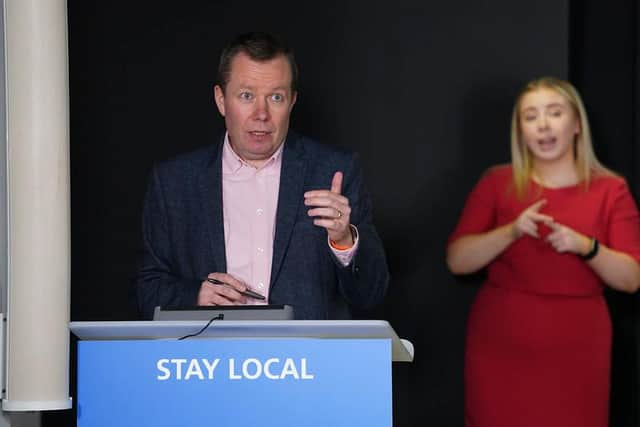Extended Glasgow lockdown may last longer than a week, says Jason Leitch
Jason Leitch, speaking on the BBC’s Sunday Show, said existing restrictions “may well” last longer than a week due to concerns about the spread of what is believed to be the Indian variant of Covid-19 in Glasgow
He said the decision to keep Glasgow in level three was made due to past experience where delaying moves to halt the spread of Covid-19 “rarely works”.


Advertisement
Hide AdAdvertisement
Hide AdAsked whether the restrictions would last longer than a week, Prof Leitch said: “It may well be.”
He said the Scottish Government’s clinical advisers would continue to meet during the week before a decision is made.
Prof Leitch also urged people across Scotland to get a test and said the rest of Scotland should “watch and be cautious”.
He said: “"It was really down to the wire on what was the right thing to do, but we have learned in Scotland and around the world that acting fast and hard always works.
"Delay rarely works and that is why we gave the advice we did.
“I think we should watch and be cautious and careful. We have decided with advice that on Monday the rest of the country is safe to move to the next stage.
"We all said that the hugging, the increased hospitality, that should all be done very cautiously.”
The comments come as Dr Gregor Smith, Scotland’s chief medical officer, took to Twitter to explain the knowledge around the so-called Indian variant, officially known as B1617.2.
Advertisement
Hide AdAdvertisement
Hide AdHe said there was “limited data” on the variant and its impact on disease severity.
Dr Smith said: “At present in parts of Scotland we have rise in cases associated with s-gene positivity. This is different from recent experience with high stable proportion s-gene target failure due to dominance B117
“The s-gene positive cases on PCR may be from a number of options – experience elsewhere suggests that a significant proportion of these will be confirmed as B1617.2 after genomic sequencing. A more rapid allele specific PCR test has been rapidly developed and is imminent
“There is limited data on B1617.2. This will rapidly evolve and is being looked at with necessary urgency.
"Initial analysis suggests it is at least as transmissible as B117, but may be more transmissible. Confidence intervals in data are wide, but will narrow with more data.
“There is insufficient data to be confident on impact on disease severity or evidence of immune or treatment escape, especially in a country with high vaccination rates. This is critical and is being developed and analysed ASAP. Some initial report are encouraging but heavily caveated.”
Dr Smith said surge testing, plus continued vaccination, would help to identify and crack down on outbreaks.
He said: “Vaccination remains our ally. It’s even more important for momentum to be maintained and accelerated where supplies allow.
Advertisement
Hide AdAdvertisement
Hide Ad"This is particularly true of second doses to provide full and sustained protection. Targeting this where there is lower uptake is especially important
“Up to a third cases may have no symptoms, but identifying these so that they and their contacts can isolate is essential, with sufficient support to do so.”
A message from the Editor:
Thank you for reading this article. We're more reliant on your support than ever as the shift in consumer habits brought about by coronavirus impacts our advertisers.
If you haven't already, please consider supporting our trusted, fact-checked journalism by taking out a digital subscription.
Comments
Want to join the conversation? Please or to comment on this article.
